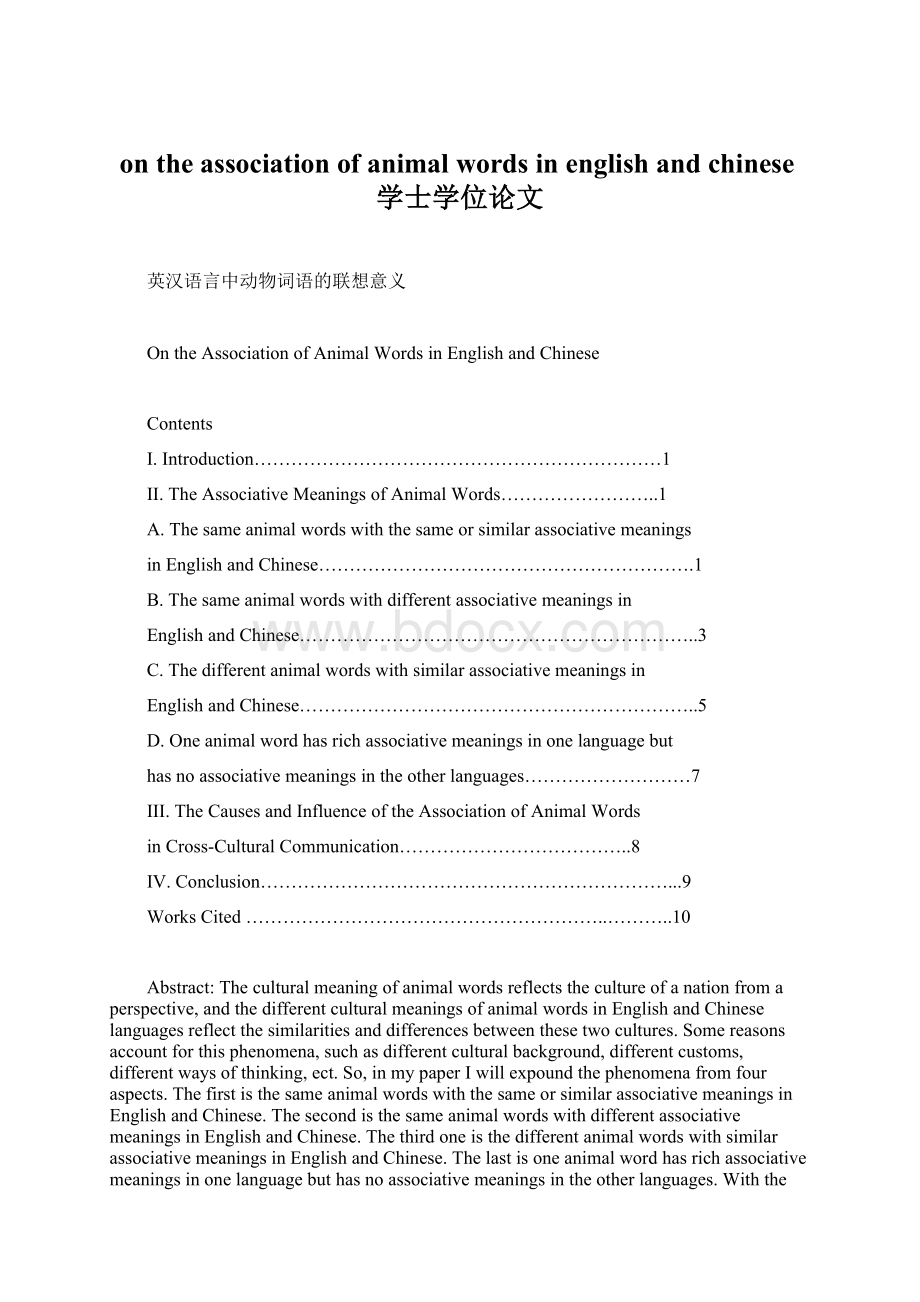on the association of animal words in english and chinese学士学位论文.docx
《on the association of animal words in english and chinese学士学位论文.docx》由会员分享,可在线阅读,更多相关《on the association of animal words in english and chinese学士学位论文.docx(8页珍藏版)》请在冰豆网上搜索。

ontheassociationofanimalwordsinenglishandchinese学士学位论文
英汉语言中动物词语的联想意义
OntheAssociationofAnimalWordsinEnglishandChinese
Contents
I.Introduction…………………………………………………………1
II.TheAssociativeMeaningsofAnimalWords……………………..1
A.Thesameanimalwordswiththesameorsimilarassociativemeanings
inEnglishandChinese…………………………………………………….1
B.Thesameanimalwordswithdifferentassociativemeaningsin
EnglishandChinese………………………………………………………..3
C.Thedifferentanimalwordswithsimilarassociativemeaningsin
EnglishandChinese………………………………………………………..5
D.Oneanimalwordhasrichassociativemeaningsinonelanguagebut
hasnoassociativemeaningsintheotherlanguages………………………7
III.TheCausesandInfluenceoftheAssociationofAnimalWords
inCross-CulturalCommunication………………………………..8
IV.Conclusion…………………………………………………………...9
WorksCited…………………………………………………..………..10
Abstract:
Theculturalmeaningofanimalwordsreflectsthecultureofanationfromaperspective,andthedifferentculturalmeaningsofanimalwordsinEnglishandChineselanguagesreflectthesimilaritiesanddifferencesbetweenthesetwocultures.Somereasonsaccountforthisphenomena,suchasdifferentculturalbackground,differentcustoms,differentwaysofthinking,ect.So,inmypaperIwillexpoundthephenomenafromfouraspects.ThefirstisthesameanimalwordswiththesameorsimilarassociativemeaningsinEnglishandChinese.ThesecondisthesameanimalwordswithdifferentassociativemeaningsinEnglishandChinese.ThethirdoneisthedifferentanimalwordswithsimilarassociativemeaningsinEnglishandChinese.Thelastisoneanimalwordhasrichassociativemeaningsinonelanguagebuthasnoassociativemeaningsintheotherlanguages.Withthedevelopmentofoursociety,theglobalizationisbecominganunavoidabletendency,andhumanbeingscontactwitheachothermoreandmorefrequently.Thisexplainsthenecessitytounderstandnotonlyourownculturebutotherculturestofacilitatethecross-culturalcommunication.Moreover,theanimalwordsplayanimportantroleintheculture,soitisnecessaryforustounderstandtheassociativemeaningsofanimalwordssoasnottomakemistakes.
Keywords:
animalwords,associativemeanings,interculturalcommunication
摘 要:
动物词汇的文化意义从一个角度反映了一个民族的文化,英汉语言中动物词汇的不同文化含义反映出英汉文化的异同。
这些不同点的存在有很多原因,比如:
不同的文化背景,不同的习俗,不同的思维方式等等。
因此,在我的论文中,我会从四个方面谈这些不同点。
第一个是相同的动物词汇在英汉语言中会产生相同或相似的联想意义。
第二个是相同的动物词汇在英汉语言中会产生不同的联想意义。
第三个是不同的动物词汇在英汉语言会产生相同或相似的联想意义。
最后一个就是一种动物词汇在一种语言中有丰富的联想意义,而在另一种语言中却没有相应的联想意义。
随着社会的发展,全球化已为大势所趋,人们之间的交流越来越频繁。
为了适应世界的发展,我们不仅要知道我们自己的文化,而且要了解其他国家的文化。
另外,动物词汇在语言文化中扮演了重要的角色。
所以,为了在跨文化交际中避免犯错误,了解动物词汇的联想意义对我们来说是很有必要的。
关键词:
动物词汇,联想意义,跨文化交际
I.Introduction
Withthedevelopmentofoursociety,languageplaysanimportantroleanditrecordstheprocessofthedevelopmentofoursocialcivilization.Humanandanimalsco-existandcontactfrequently.Therefore,thereareagreatquantityofanimalwordsandphrasesinhumanlanguages.Andhumanendowthemwithcertainfeelingsandmeaningsaccordingtoanimals’appearances,habits,ect.EnglishandChineseallhavelonghistoryandrichculturalheritage.Intheirlanguages,therearealotofanimalwordswithassociativemeanings.Theanimalwordsarethesummaryofhumanlife,themarkofthedevelopmentofhumanlanguageandthesymboloftheprocessofhumancivilization.Oursocietyisdevelopingveryfast.Theglobalizationisinfluencingourlife.WesternandChineseculturescommunicatewitheachotherfrequently.Soitishelpfulforustounderstandandmastertheassociativemeaningsofanimalwords.
II.TheAssociativeMeaningsofAnimalWords
Whenwetalkaboutassociativemeaning,weshouldknowwhattheassociativemeaningis.Asweallknow,awordhasnotonlyitsconceptualmeaning,butitsassociativemeaning.Theconceptualmeaningisthebasicmeaningofaword.However,theassociativemeaningnotonlyhastherelationshipwithlanguage,butalsohasdeeprelationshipwithculture.Theassociativemeaningofawordistheextendedmeaningsofit.Itsappearanceisrelatedtotheculture,environment,psychology,ect.So,theassociativemeaningofawordisthetotalmeaningsapersonthinksofwhentheyhearorseetheword.
A.ThesameanimalwordswiththesameorsimilarassociativemeaningsinEnglishandChinese
Therearemanyphraseswhichcontaincertainmeaningsofanimalwords.Itisveryeasytounderstandtheirforms,andthenwecanassociatetheassociativemeaningsofthem.Itgoeswithoutsayingthatbecauseofthesimilarityofthewaysofthinking,thesameanimalwordsmayhavethesameorsimilarassociativemeanings.
InEnglishandChineselanguages,peoplehavethesameassociativemeaningstopig.Inpeople’smind,theythinkpigisugly,dirty,lazy,greedyandrough.Thisisreallyunfair.Peopleabusepigbuttheyeatpork.InChineselanguage,therearemanyphrasesaboutpig,suchas“asfatasapig”,“aslazyasapig”andsoon.Thesearedirtywordswhichpeopleusethemtoabuseothers.ThePilgrimagetotheWestisoneofthefourfamousbooksinChina.Itisamyth.Inthisnovel,Zhubajieisanugly,lazy,greedyandlustpersonandheisveryhateful.InEnglish,apigreferstoagreedy,dirtyorbad-manneredperson.Sopeoplealwaysuseittorefertoapersonwhoisgreedy,lazyanddirty.Therearealsomanyidiomsofpigwhichalmosthavederogatorymeanings.Forexample,“eatlikeapigormakeapigofoneself”,“yougreedypig”,“pigsinclover”,“buyapiginapoke”andsoon.
ThesamecasehappenstothewordwolfinEnglishandChinese.Itisassociatedwithviolent,cunningandgreedy.InChinesewecanfind如狼似虎(ferocious),狼心狗肺(ungrateful),狼吞虎咽(wolfdown)狼子野心(wolfishambition)ect.InEnglish,wemeet“wolfdown”,“throwtothewolves”,“haveawolfbyeats”,“crywolf”,“wolfinsheep’sclothing”,“asheepamongwolves”andsoon.Theyallexpressderogatorymeanings.Moreover,whenawolfrepresentsaperson,itmeansamanwhoisalwaysreadytomakesexualadvancestoawoman.SoinEnglish,thereisaidiom“awolfwhistle”whichmeansamanattractsawoman’sattentionwithwhistlewhenheseesabeautifulwomanontheroad.InChinesepeoplealwaysuse“Selang”toexpressthiskindofperson.
Foxrepresentsthepersonwhoisverycunning.InEnglish,therehave“heisafox,ascunningasafox”.Foxalsohasanothermeaning.Itmeanssexuallyattractivewoman.InChineseitisaderogatorymeaninganditmeans“Hulijing”whoalwaysseducesman.ButinEnglishithastheoppositemeaninganditmeansaverybeautifulwoman.
TherearealsomanyotheranimalwordswhichhavethesameorverysimilarassociativemeaningsinEnglishandChinese.Forexample,beesymbolizesdiligenceandthequalityofhardworkingbothinEnglishandChinese.Soweoftenusethephrase“asbusyasabee”todescribeapersonwhoisbusyandhardworking.Parrotisabirdwhichcancopypeople’spronunciation.Itrepresentsapersonwhoonlycopiesotherpeopleanddoesn’thavehisownopinion.PeopleuseasstodescribeapersonwhoisstupidandobstinatebothinEnglishandChinese.Forinstance,“heisratheranassinsomeways”,“makeanassofoneself”
B.ThesameanimalwordswiththedifferentassociativemeaningsinEnglishandChinese
Becauseofdifferentculturalbackgrounds,thesameanimalwordsmayproducedifferentassociativemeanings.ThisreflectsthedifferencesbetweenEnglishandChineseculturesandembodiestheindividualityofnationalcultures.Dragonisthemostrepresentativeexample.InChineseculture,dragonisacapricioussupernaturalanimal.Itisnotarealanimalbutananimalwhichisimaginedbyhumanbeings.InancientChina,theimperialKingnamedthemselves“Zhenlongtianzi”.Commonpeoplethoughtthedragonastheirpowerofspirit.NowweChinesepeopleallbelievethatitisthesymbolofChinesenation.Chinesepeoplenotonlyathomebutalsoabroadallnamethemselves“theoffspringsofdragon”.Wecanfindtheimageandtraceofdragonalmosteverywhere,suchasinpainting,sculpture,calligraphyandbuilding.Nowdragonhasbecomeanimmortalspiritandwecallthisas“dragonculture”.SotherearemanyidiomaticphrasesinChinese.Forexample,龙腾虎跃(dragonsrisingandtigersleaping—asceneofbustlingactivity),生龙活虎(doughtyasadragonandlivelyasatiger),龙飞凤舞(likedragonsflyingandphoenixesdancing—livelyandvigorousflourishesincalligraphy)andsoon.TheseallreflecttheassociativemeaningsofdragoninChineseculture.Whileinwesternculture,dragonistherepresentativeofevil.Itisthedevilincarnation.IntheBible,thegreatdragonreferstoSatan.Andtheolddragonisdevil.InEnglish,dragonalsomeansafiercebad-temperedoldwoman.Becausethesameanimalwordshavedifferentassociativemeanings.PeopleinwesterncountrieswanttoexpresstheconceptofdragoninChinese,theywillsayChinesedragon.InAsia,therearethreedevelopedcountriesandonedevelopedarea,Japan,Korea,SingaporeandHongKong.Wecallthem“Sixiaolong”.Inordernottomakemistakesincommunication,wecallthemfourtigersbutfourdragons.
Becauseofthedifferencesofaestheticappreciationandsocialpsychology,thesameanimalwordswillproducedifferentassociativemeaningsinEnglishandChinesecultures.SomeanimalwordsexpressgoodmeaningsinEnglish,whileinChinesetheyexpressderogatorymeanings,suchasdog,owlandsoon.Undermostconditions,Chinesepeoplethinkdogisaverydisgustinganimal.InChinese,thewordswhichcontaindogalmostexpressderogatorymeanings,suchas狗仗人势(likeadogthreateningpeopleonthestrengthofitsmaster’spower—beafullyundertheprotectionofapowerfulperson),狼心狗肺(ungrateful),